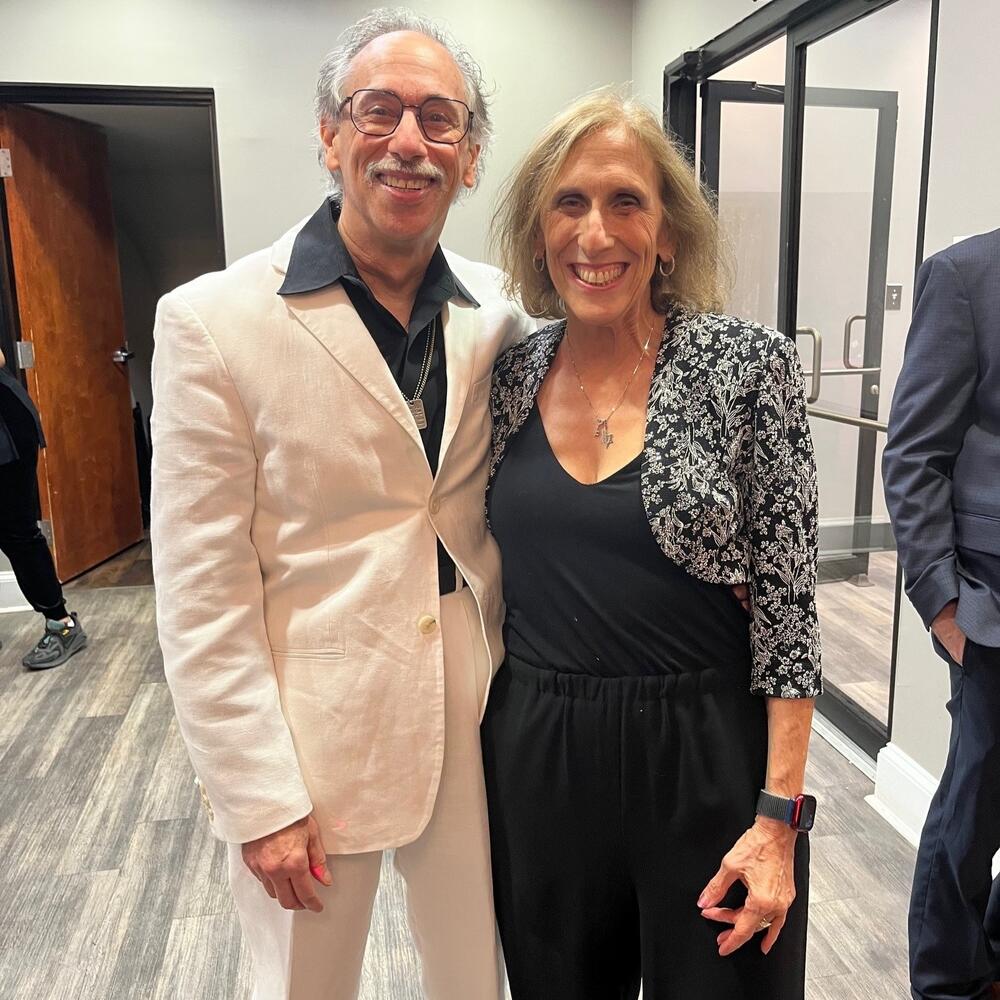
Caption
Alan Weintraub and Louise Weintraub pose for a 2023 photo. Alan was an early contractor of COVID-19 in March 2020 and still struggles with Long COVID years later.
Credit: Contributed
|Updated: June 10, 2025 10:11 AM
LISTEN: Recent changes to federal COVID vaccine recommendations mean fewer people, including children, pregnant women and people under 65 are likely to be vaccinated. Some worry this could lead to more people with long-term complications. GPB's Ellen Eldridge reports.

Alan Weintraub and Louise Weintraub pose for a 2023 photo. Alan was an early contractor of COVID-19 in March 2020 and still struggles with Long COVID years later.
Andrew Lucas of Flowery Branch in Hall County was one of the first Georgians to contract SARS-CoV-2 and develop COVID-19.
"At 4:30 on March 4, 2020, I started coughing," Lucas said. "It was all downhill from there."
He continued working from home alongside his wife and son over the next few weeks as he grew sicker.
By April, he needed an oxygen tank.
"My lung volume was so low, I was actually on a lung transplant list for 18 months," he said.
His physician, Dr. Danny Webb, went to the Centers for Disease Control and Prevention in Atlanta after Lucas told him he thought it could be COVID.
"I called him I don't know how many times in the middle of the night, crying, 'Danny, I can't breathe, Danny, can't breathe,'" Lucas said, "and, of course his thing was, 'Hey, if you're there, go to the hospital' and that wasn't gonna happen."
Lucas isolated in his home for 42 days with his family, who avoided infection until after they received COVID vaccines. When his wife and son contracted COVID two years later, they were only sick for two days, Lucas said.
Now, after more than five years, 49-year-old Lucas is still struggling.
"Last week, I had three days last week where I slept 20-plus hours each of those days," he said. "I feel like I'm an invalid."
He still uses the oxygen tank continuously, and had to leave the work he loved and do something less physically and mentally taxing.
The CDC recognizes Long COVID as a chronic condition experienced after coronavirus infection and is present for at least three months. More than one million Georgians have reported Long COVID symptoms and many have been unable to work and ineligible for disability.
Dr. Alan Weintraub closed his medical practice in Peachtree Corners as soon as he could because of the severity of his Long COVID symptoms.
"It's still a very rough go for somebody with Long COVID to get disability," he said. "So, I literally hung on until I qualified for Medicare, and I dragged myself to work."
Like Lucas, Weintraub contracted one of the earliest coronavirus cases reported in Georgia, in March 2020.
"My wife got sick," he said. "She had this classic COVID cough — that wracking, painful cough. We spoke to our doctor, and he was convinced, which was the case, that it was COVID."
Two weeks later, Weintraub couldn't smell his morning cup of coffee.
"I was freaking out and I went closer and I said, 'I have COVID,'" he said. "I developed immediately what's called dysautonomia, where your blood pressure and pulse regulation are not related to your movement, and so I actually was about to go upstairs to tell my wife and I stood up too quickly and I passed out."
His wife, Louise Weintraub, recovered quickly from her infection, but Alan Weintraub developed severe, chronic migraine headaches and terrible vertigo. It took six months for his sense of smell to return.
Every single organ system in his body was affected by COVID, Weintraub said.
Now, he has a dozen different doctors treating symptoms: a cardiologist for blood pressure, a neurologist and an Ear Nose and Throat (ENT) doctor for vertigo, a rheumatologist, four different vestibular therapists and even a gastroenterologist for irritable bowel syndrome.
"Thus far, for people like myself with Long COVID, you treat the symptoms," he said. "There's not one magic pill that you can take that treats Long COVID."
When he was able to sit up and read in bed, Weintraub caught up with the latest medical research into this novel virus and its effects.
Five years into what is now an endemic disease, Weintraub and other medical experts say people who stay up-to-date with their COVID immunizations have a much smaller likelihood that they will develop Long COVID.
Recent changes to the federal vaccine recommendations concern both Lucas, who said he opposes the vaccine for himself, and Weintraub, who worries that the COVID vaccine won't be widely available.
Further variants are going to restricted for those over 65 and those deemed high risk, Weintraub said.
"Quite frankly, I'm not sure who is making that determination of high risk," Weintraub said. "Now, I have had every COVID vaccine, and I will be able to qualify for that next variant, which I will get, but the bulk of the population will not."
Lucas has also spent time researching his disease. His concern over vaccination comes from reports of post-vaccination syndrome (PVS), which remains unrecognized by medical authorities, and little is known about its biological underpinnings.
In a new study, Yale researchers have taken initial steps to characterize this condition, uncovering potential immunological patterns that differentiate those with PVS from others. The findings are early and require further confirmation but may eventually guide strategies to help affected individuals, the university reported.
“This work is still in its early stages, and we need to validate these findings,” said Akiko Iwasaki, Sterling Professor of Immunobiology at Yale School of Medicine (YSM) and co-senior author of the study published Feb. 19 as a preprint on medRxiv. “But this is giving us some hope that there may be something that we can use for diagnosis and treatment of PVS down the road.”
An earlier version of this story erroneously said Alan Weintraub's medical practice was in Newnan.